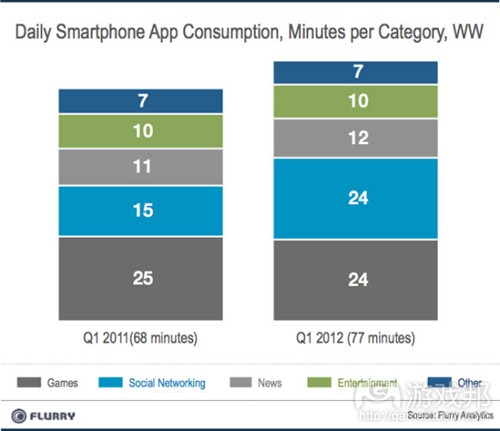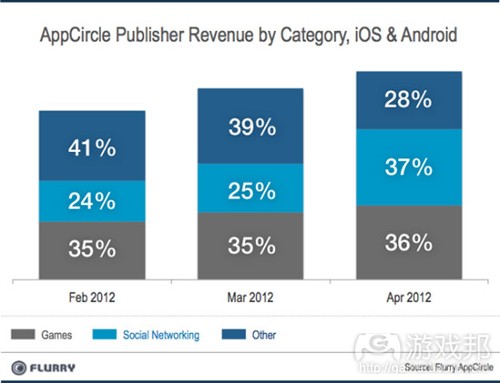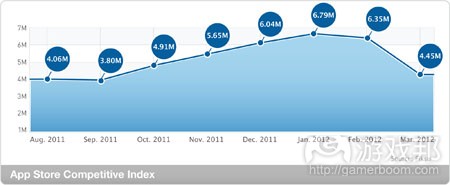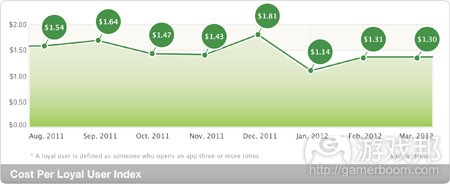每日观察:关注社交网络应用使用率赶超手机游戏(4.28)
1)Flurry最新数据显示,2011年第一季度,游戏领先于社交网络,以平均每天25分钟的使用率成为最热门的手机应用;但在2012年第一季度,这两种应用类型的使用率基本持平,平均每天使用时间都是24分钟。
Flurry报告指出,手机应用发展速度减缓或与其需求将达到饱和状态有关。报告还发现,社交网络应用的广告收益增长速度超过手机游戏,在2012年2月至4月间,游戏应用在Flurry的AppCircle平台广告收益分别占比35%和36%,而社交网络应用在同一时期广告收益比例则从24%增长至37%,社交网络应用在4月份的广告收益首次超越游戏应用。
Flurry报告称智能手机游戏将达到一个瓶颈状态,难以吸引新用户,只能在有限的用户规模中相互竞争。休闲智能手机游戏将与日益壮大的社交网络应用争夺新用户,普通用户将更易被非游戏应用所吸引。
2)移动分析公司Fiksu最近报告指出,2012年3月份美国前200名App Store免费应用日均下载量为445万次,比2月份下降30%,这是自iPhone 4S发布以来的最低点(游戏邦注:2月份日均下载量为635万次)。
Fiksu分析称这种现象或与3月份没有假期和节日,并且鲜有苹果新闻及重要免费游戏发布有关,另外苹果在2月至3月间制裁人为操纵应用排名的举措也是一大因素。
3月份应用发行商获取App Store忠实用户的成本已从2月份的1.31美元微降至1.3美元(游戏邦注:Fiksu报告数据取自其监测的210亿次手机应用操作行为,以及2.8亿以上的应用下载量)。
3)据gamasutra报道,《愤怒的小鸟》系列游戏的两名开发者近日离开Rovio,在芬兰赫尔辛基组建工作室Boomlagoon,致力于开发网页及手机游戏。
这两名成别分别是《愤怒的小鸟》、《愤怒的小鸟节日版》及《愤怒的小鸟:里约》主要美术设计师Tuomas Erikoinen,现任Boomlagoon工作室CCO;另一者则是担任首席执行官的Antti Sten。
4)Zynga最近向亚马逊Kindle Fire平台推出热门游戏《Draw Something》,与iOS和Android版本一样同时推出免费版本及1.99美元的付费版本。
5)据The Verge报道,谷歌预计2011至2012年间的Android平板电脑销量将达1000万部,占据三分之一的平板电脑市场份额。
6)Big Fish Games总裁兼首席执行官Jeremy Lewis将于4月30日卸任,由其前任Paul Thelen重新担任公司掌门人。
Thelen于2002年成立Big Fish并担任公司总裁及首席执行官,推出了《Mahjong Towers》和《Mystery Case Files》系列等热作。
Jeremy Lewis之前是高盛投资公司总经理,他在Big Fish就职期间使公司发展成为拥有600多人团队的大型休闲游戏公司。
Big Fish最近财报指出公司在2011年销售额增长30%,达到1.8亿美元,其中多数来PC和智能手机平台的数字销售渠道。(本文为游戏邦/gamerboom.com编译,拒绝任何不保留版权的转载,如需转载请联系:游戏邦)
1)Smartphone games face new competition from social apps, says report
by Tom Curtis
Over the past 40 months, games have remained the dominant app category on smartphones, but according to new data from Flurry Analytics, social networking apps have recently narrowed the gap.
The firm’s new report (which excluded data from tablets) compared smartphone usage across various app categories and found that in Q1 2011, game app usage led social networking app usage by an average of 10 minutes per day, but in Q1 2012 those categories were even, with users spending an average of 24 minutes per day using apps in each category.
With social networking and game app usage now neck and neck, smartphone games have a real rival on the app market. Flurry warned that since game apps are seeing slower growth, demand could be reaching a saturation point, which partially explains why consumers are taking interest in other app categories.
In addition, Flurry noted that social networking apps have seen a much faster increase in ad revenue than games have. Between February 2012 and April 2012, game apps earned a respective 35 percent and 36 percent of total ad revenue on Flurry’s AppCircle network, while social networking apps increased from 24 percent to 37 percent.
While this data only addresses apps that leverage Flurry’s traffic acquisition network, the firm noted April marks the first month in which social networking apps have generated more ad revenue than games.
Looking at the data at large, Flurry reported that growth for game apps on smartphones could be reaching a plateau. As it becomes more difficult to attract new players, the firm says smartphone games will eventually have to fight over a finite audience of users if they hope to grow their business.
Even as new players enter the market, Flurry said casual smartphone games will also have to compete with the increasingly popular social networking space, as those same casual users have become increasingly attracted to apps outside of the game category.(source:gamasutra)
2)Were bot farms generating a third of all free downloads on US App Store?
by Jon Jordan
Every month, mobile monetisation outfit Fiksu releases metrics about iPhone downloads and cost of getting users.
As with all such data, the monthly absolutes are a bit meaningless. It’s only when you compare month-on-month that you see the trends.
And this month sees a massive trend in terms of downloads.
Cooking the books
Tracking the average daily number of downloads from the US top 200 free apps, Fiksu says the total dropped a massive 30 percent in March to 4.45 million.
That’s the lowest the monthly total has been since before the iPhone 4S was released. In February, the daily download total was 6.35 million, .
There are two possible reasons. One is that in March was a quiet month, without any holidays, exciting Apple news or major free game releases.
The other is more sinister, however, as during February and March Apple cracked down on the use of bot farms.
These are banks of computers, which are used to automatically download free content from the App Store to boost chart position.
Either or
Fiksu is even-handed in its evaluation of the situation.
“An unexpected contributing factor could be the decline in the use of robotic install tactics by app marketers responding to Apple’s new policy,” commented CEO Micah Adler.
However, others in the industry were much more forthright in their comments, with accusations that the practice was industry-standard for many developers and publishers, especially the well-funded social mobile outfits.
Dog don’t bark
Fiksu also tracks the Cost per Loyal User Index.
This is based on the amount of cash it costs a publisher to get a user who will start their app up three times or more.
It dropped marginally in March to $1.30, from $1.31 in February.
This also suggests Apple’s ban bot farms was the major reason for the drop in downloads, as by the laws of supply and demand, it should have risen sharply if there were a third less real people downloading apps.
You can see Fiksu’s research, which is generated from more than 21 billion mobile app actions and more than 280 million downloads – here.(source:pocketgamer)
3)Former Angry Birds leads form game studio Boomlagoon
by Mike Rose
Two of the lead creators of the Angry Birds franchise have left development studio Rovio to start a new game development team, with a focus on web and mobile games.
Boomlagoon is CCO Tuomas Erikoinen, originally the lead artist on Angry Birds, Angry Birds Seasons and Angry Birds Rio, and CEO Antti Sten, who describes his role at Boomlagoon as “the main with the plan.”
The pair, based in Helsinki, Finland, is aiming to create “convivial and intriguing games,” although the studio has not yet divulged details of games it is working on. (source:gamasutra)
4)Draw Something now on Fire — Zynga has brought its smash-hit social game Draw Something to the Kindle Fire. As with iOS and Android, the game is available in both a free and a paid $1.99 version in the Amazon Appstore.(source:insidemobileapps)
5)Google expected to sell 10 million Android tablets in 2011 — Google had lofty goals for its tablet plans. The company expected to sell 10 million tablets a year in 2011 and 2012, owning a third of the tablet market, reports The Verge.(source:insidemobileapps)
6)Big Fish’s former president, CEO returns to head the company
by Eric Caoili
Big Fish Games’ president and CEO Jeremy Lewis will resign from his roles at the company, allowing his predecessor Paul Thelen to once again head the casual game developer and publisher.
Thelen founded Big Fish in 2002, and served as the Seattle-based company’s president and CEO while the studio made a name for itself with hit games like Mahjong Towers and the Mystery Case Files series.
He eventually brought in Lewis, formerly a managing director at Goldman Sachs, to take over those roles several years ago. During his tenure, Lewis helped build Big Fish into one of the largest casual game companies with some 600 employees.
The publisher recently reported its ninth straight year of record revenues after seeing its sales increased by 30 percent year-over-year to $180 million in 2011 — mostly from growth in digital sales for its 2500+ game catalog across PCs and smartphones.
In a company memo obtained by AllThingsD, Lewis shed some more light on the company’s success, noting, “To date in 2012 we’ve achieved several record breaking $1MM+ revenue days on our PC and Mac platform.”
Lewis’ departure comes as Big Fish prepares to launch its Universal Cloud Gaming Service, expand its PC/Mac/mobile marketplaces to offer free-to-play games, and enter Facebook’s social casino games market after its acquisition of Self Aware Games (Card Ace: Casino).
He will step down from his positions on April 30, but he will stay on Big Fish’s board of directors. While Lewis headed the company, Thelen served as the chief strategy officer and board of directors chairman for Big Fish. (source:gamasutra)














































